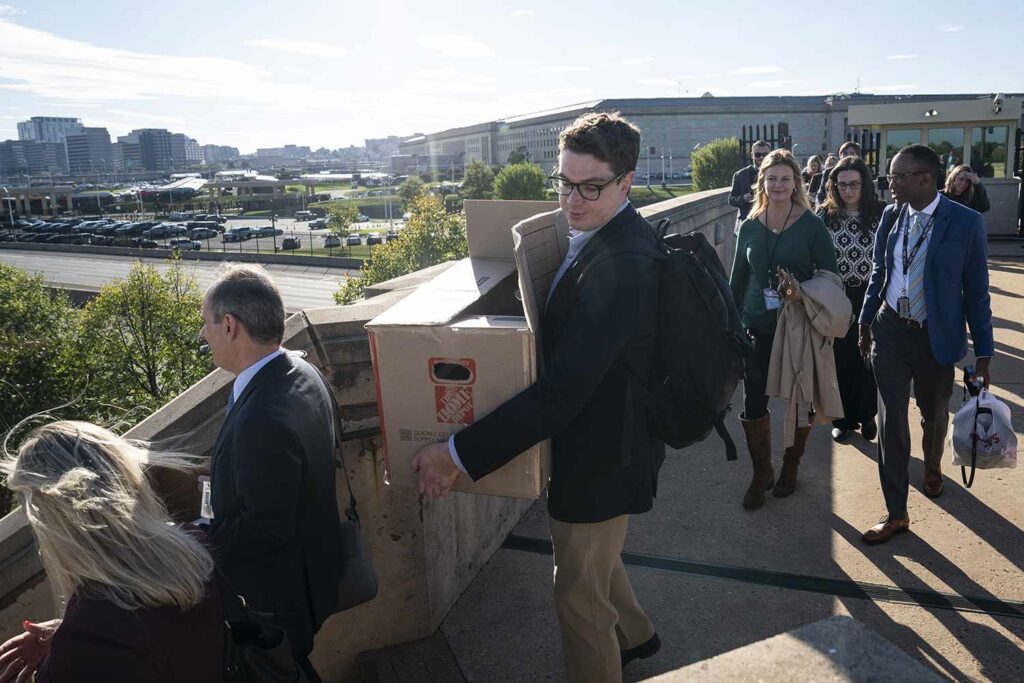NEED TO KNOW
Reporters who have made careers out of covering the Pentagon forfeited their Department of Defense press credentials and staged a walkout at the headquarters on Wednesday, Oct. 15, after the Trump administration attempted to severely restrict their coverage of the United States military.
For many years, journalists who wanted to obtain press passes for the Pentagon were asked to sign a simple, one-sheet agreement that included rules about proper credentials, locking office doors and reporting suspicious behavior.
But Defense Secretary Pete Hegseth made a major shakeup to the agreement recently by giving members of the Pentagon press corps a new packet of restrictions to sign that would force journalists to give up many of their rights and put themselves at risk of prosecution in order to retain access to the DOD headquarters.
The new requirements were rejected by all but one outlet that regularly covers the Pentagon, including ABC News, NBC News, CBS News, Fox News, CNN, Newsmax, The Associated Press, Reuters, Bloomberg News, The New York Times, The Washington Post, The Wall Street Journal, The Guardian, The Atlantic, The Washington Times, Financial Times, Politico, and NPR.
Jabin Botsford/The Washington Post via Getty
The major broadcast networks issued a joint statement on Tuesday, Oct. 14, saying, “Today, we join virtually every other news organization in declining to agree to the Pentagon’s new requirements, which would restrict journalists’ ability to keep the nation and the world informed of important national security issues. The policy is without precedent and threatens core journalistic protections.”
NPR’s Tom Bowman said in an op-ed that signing the document would turn Pentagon reporters into “stenographers parroting press releases, not watchdogs holding government officials accountable.”
Even the far-right broadcaster Newsmax stated that Hegseth’s new requirements “are unnecessary and onerous.”
As of Oct. 14, the only outlet that had agreed to the terms is One America News Network, a fringe MAGA mouthpiece that has peddled conspiracy theories and described itself as one of Trump’s “greatest supporters.” That means that moving forward, OANN’s Pentagon reporters will only be allowed to report on materials that the Department of Defense has approved.
Win McNamee/Getty
The mass expulsion of military reporters — who packed their belongings and defiantly left the Pentagon together on Wednesday afternoon — means that, for the first time since the Eisenhower administration, no major U.S. television network or publication will have a permanent presence in the Pentagon.
The New York Times provided a breakdown of the new policies as laid out by Hegseth, who worked as a Fox News host until Trump tapped him for the new role.
“The revised policy threatens to punish journalists for ordinary news gathering protected by the First Amendment,” the Times said. “Reporters also lose access to parts of the building, now requiring an escort to go to those areas.”
As The Associated Press put it, the rules would “leave journalists vulnerable to expulsion if they sought to report on information — classified or otherwise — that had not been approved by Hegseth for release.”
Hegseth shared his own summary of the new policies in a post on X on Oct. 13.
“Pentagon access is a privilege, not a right,” he wrote. “So, here is @DeptofWar press credentialing FOR DUMMIES: Press no longer roams free. Press must wear visible badge. Credentialed press no longer permitted to solicit criminal acts. DONE. Pentagon now has same rules as every U.S military installation.”
Hegseth’s warning about “soliciting criminal acts” seems to stem from a section of the new requirements that warns members of the press, “If you solicit the disclosure of such information or otherwise encourage [DOD] personnel to violate laws and policies concerning the disclosure of such information, such conduct may weigh in the consideration of whether you pose a security or safety risk.”
It further describes “solicitation” in this context to mean calling or messaging military personnel for tips or nonpublic information, as reporters frequently do on their cell phones or personal social media accounts.
The Hill reported on Tuesday that Hegseth’s final restriction was a major sticking point for many, citing the Pentagon Press Association as saying that the DOD was trying to “stifle a free press.”
“[The new policy] conveys an unprecedented message of intimidation to everyone within the DoD, warning against any unapproved interactions with the press and even suggesting it’s criminal to speak without express permission — which plainly, it is not,” the Pentagon Press Association added.
Hegseth, however, has seemed to take the departures in stride. His personal X account reposted several outlets’ statements about why they would not be signing the Pentagon’s new press access policy and simply responded with a waving hand emoji.
Never miss a story — sign up for PEOPLE’s free daily newsletter to stay up-to-date on the best of what PEOPLE has to offer, from celebrity news to compelling human interest stories.
Many affected journalists have spoken out about their decision to walk away on social media and in essays, sharing a common theme that they intend to continue serving as Pentagon watchdogs even if they’re no longer physically in the building.
By declining to agree to Hegseth’s demands, they retained the right to freely cover the Pentagon.

